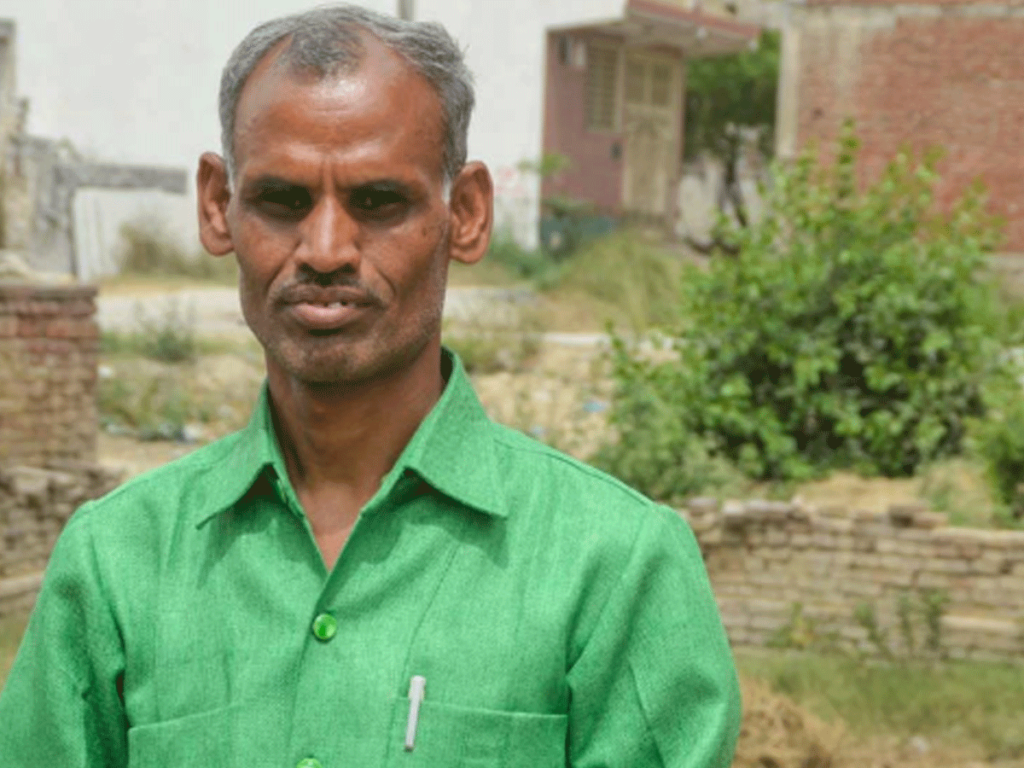Rajkumari Sharma Tankha
Vijay Pal Baghel is an average-looking man residing in Govindpuram, a small locality in Ghaziabad, Uttar Pradesh and looking at him you just cannot believe that behind these ordinary looks lies a steely resolve. Why I consider him a hero you will come to know shortly.
Born and brought up in Hathras (Uttar Pradesh) Baghel is a man with a mission, a mission to turn people into tree-lovers. Called by varied names as Greenman, Van Vibhuti and Vanjeev Rakshak, Baghel runs Paryavaran Sachetak Samiti, an organization dedicated to environment.
Baghel has planted more than five crore trees till date. But this is not his only feat. He is also credited with beginning the Jhola Andolan to educate people against the harmful effects of using polythene bags. He even holds the world record of planting highest number of trees (1.25 lakh) in a single day for which his name appears in Guinness Book of World Records 2013.
So far he has got 11 awards, including the Dr. A.P.J.Abdul Kalam award and Shaan-E-Hind award that he got early this year for his work on environment conservation.
What’s more, his work has been recognized, by none other than the National Council of Educational Research and Training (NCERT). The NCERT has incorporated his life and works in the chapter People who made the deference of Class 8 Social Science book. And, the UP government has named a wetland in Shravasti district as ‘Baghel Wetland’.
“The seeds of what my life would become were sown by my grandfather Dataram Baghel,” he says. “It was in 1972 that as a class V student, we got an assignment to write 10 lines on Tree. Those 10 lines that I wrote with his help stayed on with me,” he adds.
“My grandfather told me to write that tree gives life to humans, and other such things. At that time I didn’t understand the meaning fully but this sentence remained with me,” he says.
Baghel completed his school and college education in Hathras before leaving for Ghaziabad for a CA (chartered accountant) course in 1986. At that time Ghaziabad was the place where all CA aspirants used to throng, and young Baghel was no different.
The change begins
The year 1987 gave a new direction to his life, and again his grandfather’s thoughts had a big role to play in it.
“My grandfather was a freedom fighter and he always used to tell me that everyone must do something for the people, for the nation. I wanted to do something for the people, but was quite confused on what I could do as a student,” he says.
“Then in 1987 I saw a roadside jamun tree being cut. It was on the GT road, at the stretch between Ghaziabad and Aligarh. I saw the sap coming out of its cut trunk and I don’t know why I felt pained. I recollected all my conversation with my grandfather and felt the tree was crying for help,” he adds, “and right there and then I decided that I would educate people against tree felling.”
But the Going was tough…
Baghel started motivating people against cutting trees. He started planting a neem tree every day. “I faced a lot of opposition, and except my grandfather, no one supported me,” he says. “At that time I had got a job in a pharma company, so I used to plant trees in after-office hours. The movement was slow but it persisted,” he says.
A big boost came in 1993, in the form of the then Environment Minister Kamal Nath’s Paryavaran Vahini.
Launched in June, 1992 with the basic objective of Paryavaran Vahini was encouraging people’s participation in environmental protection, it was to create environmental awareness and involve people through active participation and reporting of illegal acts pertaining to forests, wildlife, pollution, environmental degradation and cruelty to animals. Its other objectives were afforestation, survival of plants and monitoring of ambient air and water quality, including vehicular pollution.
“Ghaziabad was one of the 14 districts where this body was set up in the beginning. It was a 20 member body, of which five were from civil society. I too became a member of it,” he says. Later in 1995, Baghel became the convenor of the Paryavaran Vahini and worked relentlessly for five years.
The making of Paryavaran Sachetak Samiti
In later half of 2000, Baghel came up with his own organization, Paryavaran Sachetak Samiti (PSS).
“Due to some reasons, the Paryavaran Vahini was folded, but I didn’t want the work In had begun to stop. So I set up PSS. By that time there was a lot of awareness about environment, ecological balance and other issues as a result many people came forward to join us,” he says.
The PSS has over 65,000 members across the country. “Each member is given an Identity card and he/she is also told about what he can and should do in his neighbourhood to prevent environmental degradation,” says Baghel.
The work PSS does
PSS is a volunteer organization and asks for no funds, no donations except for saplings. It seeks or takes no government grant either.
The Samiti undertakes the work through mass campaigns, Information / Education / Communication programs and grass root level community involvement for ecological conservation. “Our primary focus is on strengthening local communities through their active participation in decision making to increase green cover, reduce air, water and soil pollution, conserve natural resources, save earth and achieve sustainable development,” says Baghel.
Apart from tree plantation drives, Baghel is also working on other environmental aspects like ban on use of polythene, global warming, development at the cost of environment and renovation of old water bodies, rainwater harvesting, recharging groundwater etc.
